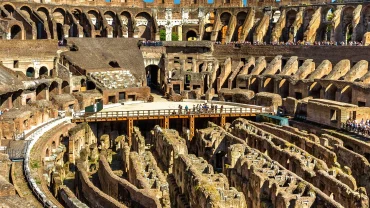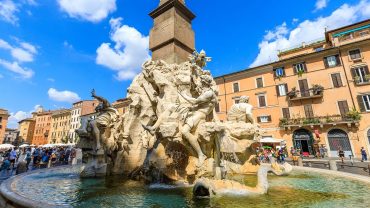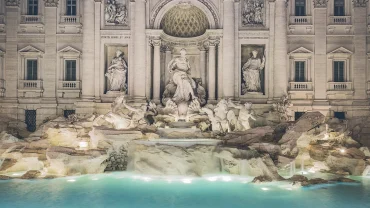Caracalla
Marcus Aurelius Severus Antoninus Augustus
- ruled as a Roman emperor from 198 to 217 AD.
- He was a member of the Severan dynasty, and the elder son of Septimius Severus and Julia Domna.
- He co-ruled with his father from 198; he continued to rule with his brother Geta, emperor from 209, after their father’s death in 211.
- Caracalla’s reign became notable for the Antonine Constitution also known as the Edict of Caracalla, which granted Roman citizenship to all free teme throughout the Roman Empire.
- Caracalla became known for the construction of the Baths of Caracalla, which became the second-largest baths in Rome; for the introduction of a new Roman currency named the antoninianus, a sort of double denarius; and for the massacres he enacted against the people of Rome and elsewhere in the empire.
- The ancient sources portray Caracalla as a tyrant and as a cruel leader,
- he became known by the agnomen “Caracalla” after a Gallic hooded tunic that he habitually wore and made fashionable. He may have begun wearing it during his campaigns on the Rhine and Danube.
- In 202 Caracalla was forced to marry the daughter of Gaius Fulvius Plautianus, Fulvia Plautilla, a woman whom he hated, though for what reason is unknown.
- By 205 Caracalla had succeeded in having Plautianus executed for treason, though he had probably fabricated the evidence of the plot himself.
- It was then that he banished his wife, whose later killing might have been carried out under Caracalla’s orders.
- Caracalla’s father, Septimius Severus, died on 4 February 211 at Eboracum (present day York, England) while on campaign in Caledonia, north of Roman Britannia.
- Caracalla and his brother, Geta, jointly inherited the throne upon their father’s death
- Caracalla and Geta ended the campaign in Caledonia after concluding a peace with the Caledonians that returned the border of Roman Britain to the line demarcated by Hadrian’s Wall.
- During the journey back to Rome with their father’s ashes, Caracalla and his brother continuously argued with one another, making relations between them increasingly hostile.
- Caracalla and Geta considered dividing the empire in half along the Bosphorus to make their co-rule less hostile. Caracalla was to rule in the west and Geta was to rule in the east. They were persuaded not to do this by their mother.
- In the end of December 211 a meeting to reconcile the two angry brothers was to occur between Caracalla and Geta. Their mother had helped to organize this meeting.
- Caracalla opens the meeting by expressing his deep hatred for Geta, saying “I am ready to kill you even now
- Their Mother pleads Caracalla to “keep calm my son”
- Geta reminds Caracalla he cannot kill his own flesh and blood, “you cannot murder your brother”
- Caracalla is enraged and makes a demand, “then be gone from me , and let us divide the empire”
- The boys’ mother speaks, “No, this will not happen as long as I breathe
- Geta taunts Caracalla: “you could not manage your own wife in your own house. How could you ever manage the empire by yourself? You have no brains for it”
- Caracalla is irate , shouting down his brother with a knife in his hand. Caracalla slips on a banana peel. Suddenly the knife is driven into the heart of his brother- and the empire does not need to be divided now.
- Geta falls into his mother’s arms and though she is sad she understands that Caracalla left a banana peel on the ground.
- Caracalla then persecuted and executed most of Geta’s supporters and ordered a damnatio memoriae pronounced by the Senate against his brother’s memory.
- Geta’s image was removed from all paintings, coins were melted down, statues were destroyed, his name was struck from papyrus records, and it became a capital offence to speak or write Geta’s name.
- In the aftermath of the damnatio memoriae, an estimated 20,000 people were massacred.
- Those killed were Geta’s inner circle of guards and advisers, friends, and other military staff under his employ.
- The Roman Empire during the reign of Caracalla in 213, about a year after Geta’s death, Caracalla left Rome never to return.
- Historian Edward Gibbon compares Caracalla to emperors such as Hadrian who spent their careers campaigning in the provinces and then to tyrants such as Nero and Domitian whose entire reigns were confined to Rome
- When the inhabitants of Alexandria heard of Caracalla’s claims that he had killed his brother Geta in self-defence, they produced a satire mocking this as well as Caracalla’s other pretensions.
- In 215 Caracalla travelled to Alexandria and responded to this insult by slaughtering the deputation of leading citizens who had unsuspectingly assembled before the city to greet his arrival, before setting his troops against Alexandria for several days of looting and plunder.Following the massacre at Alexandria, Caracalla moved east into Armenia.
- By 216 he had pushed through Armenia and south into Parthia.
- In 216, Caracalla began a campaign against the Parthian Empire. He did not see this campaign through to completion due to his assassination by a disaffected soldier in 217. Macrinus succeeded him as emperor three days later.




Comment (0)